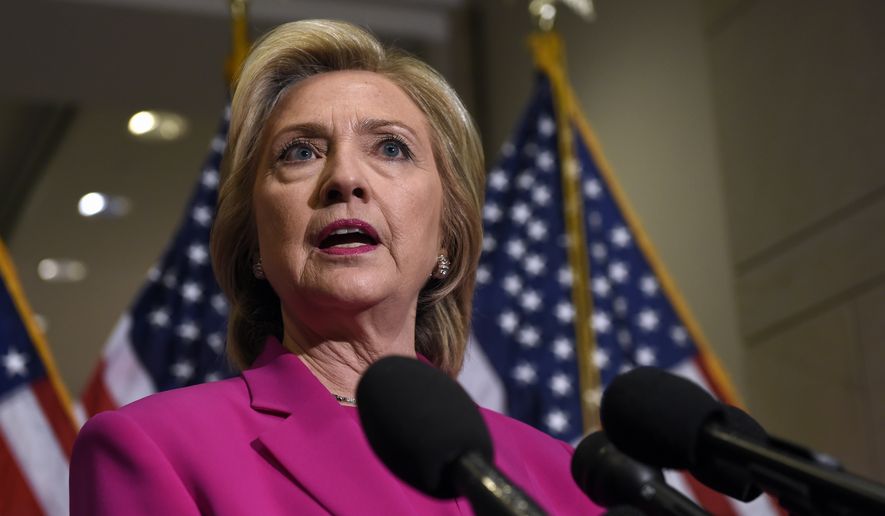Hillary Rodham Clinton has a problem with Uber. Jeb Bush and Rand Paul are hitting back, and one of the first economic debates of the presidential campaign season is suddenly in full swing.
In her highly touted economic policy speech on wage inequality and job creation Monday in New York, Mrs. Clinton unexpectedly took what was seen as a sideswipe at Uber, Airbnb and other pioneers of the “sharing economy,” saying the model left too many workers reliant on short-term contracts and freelance gigs without the benefits and protections of traditional jobs.
Mr. Bush and Mr. Paul, who are seeking the Republican presidential nomination next year said the remarks by Mrs. Clinton, the Democratic presidential front-runner, showed that she was trying to stifle 21st-century innovation and standing in the way of economic progress.
Mr. Bush’s campaign even put out word that the candidate will summon an Uber driver in San Francisco during a campaign swing there this week.
Supporters say companies such as the ride-hailing Uber provide flexibility to workers and consumers with a minimum of government regulatory oversight. Critics such as Mrs. Clinton say the “gig economy” model may have its virtues, but it leaves workers as disposable contractors with potentially no recourse for mistreatment by a company.
“Many Americans are making extra money renting out a small room, designing websites, selling products they design themselves at home, or even driving their own car,” Mrs. Clinton said in her address. “This on-demand, or so-called gig economy is creating exciting opportunities and unleashing innovation. But it is also raising hard questions about workplace protections and what a good job will look like in the future.”
Although Mrs. Clinton didn’t name any companies specifically, many critics believe she was targeting ride-hailing and home-sharing services such as Uber, Lyft and Airbnb.
Mr. Bush pounced.
“Americans want to work and want the opportunity to achieve earned success for their families, but Secretary Clinton’s antiquated proposals protect the special interests that want to stifle American ingenuity and 21st-century companies like Uber that are creating jobs,” said Allie Brandenburger, a spokeswoman for the Bush presidential campaign.
Republican presidential contender Rand Paul also attacked the former secretary of state for her comments about people who join the sharing economy.
“Services like Uber, Airbnb and Lyft stimulate our economy and work towards lower prices. How is this bad, Hillary Clinton?” the senator from Kentucky tweeted. He went on to call Mrs. Clinton’s ideas “out of touch” in a country that needs “more innovation, not less.”
The Clinton campaign, stung by the backlash, responded to its Republican critics by rejecting the suggestion that Mrs. Clinton plans to wage a war on the sharing economy.
“She’s not calling out specific sectors, or any one company, but is addressing an economy-wide problem that has existed for years,” the Clinton campaign’s chief technology officer, Stephanie Hannon, wrote in a post on Medium. “I’ve been surprised to see these common-sense comments get misrepresented as an attack on the sharing economy.”
At a Christian Science Monitor breakfast Tuesday, Clinton senior policy adviser Jake Sullivan rejected the notion that Mrs. Clinton had a “beef” with Uber.
“It’s an interesting question with a totally wrong premise,” Mr. Sullivan said.
The Democrat sees great opportunities with the rise of the sharing economy, but “it also does raise hard questions about workplace protections and the future of work,” he said.
The gig economy may be a new fixture in political discussions, but it is no stranger to public controversy.
Uber, for example, has faced staunch opposition from authorities and workers in the United States and around the world who argue that the ride-hailing service is undercutting established business practices in the taxi industry and skirting safety regulations.
Violent protests broke out in Paris last month over the ride-booking business. Angry cab union members took to the streets and burned cars, blocked traffic and attacked suspected Uber drivers. Similar protests also have erupted in Mexico City, prompting the local government, and those of other countries, to suspend or outlaw the practice.
Supporters say companies such as Uber offer many advantages, including a measure of choice for consumers in what have been highly regulated and protected industries. They say such opportunities, such as using a personal car as a taxi or renting out a room in a home to weekend vacationers, as in the case of Airbnb, help offset tough economic conditions and make work schedules more flexible.
Even President Obama has offered praise for the gig companies made possible by the information and communication revolution.
“Part of what technology has enabled is the same thing that’s driving something like Uber or Airbnb — this concept of the share economy,” Mr. Obama said last year.
• Brennan Weiss can be reached at bweiss@washingtontimes.com.




Please read our comment policy before commenting.